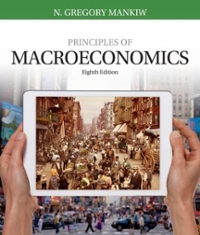Answered step by step
Verified Expert Solution
Question
1 Approved Answer
Business economists often face several challenges in relation to politics and policymaking: Political Bias: Economists are often accused of being politically biased. Their analyses and
Business economists often face several challenges in relation to politics and policymaking: Political Bias: Economists are often accused of being politically biased. Their analyses and recommendations can be influenced by their personal political beliefs or the political leanings of the organizations they work for. Short-Term vs Long-Term: Politicians often focus on short-term gains to win votes, while economists tend to think in terms of long-term consequences. This can lead to conflicts when economists recommend policies that may have short-term costs but long-term benefits. Complexity of Economic Theory: Economic theories can be complex and difficult for the general public and policymakers to understand. This can lead to misinterpretation or misuse of economic advice. Uncertainty: Economic predictions are often uncertain, which can lead to skepticism and criticism from the public and policymakers. Economists may be out of favor with the public and certain policymakers for several reasons: Perceived Lack of Relevance: The public and policymakers may feel that economists focus too much on abstract theories and not enough on practical solutions to real-world problems. Failure to Predict Economic Crises: Economists have been criticized for failing to predict major economic crises, such as the 2008 financial crisis. This has led to a loss of trust in the profession. Disagreement Among Economists: Economists often disagree with each other, which can confuse the public and policymakers and lead to a perception that economists don't know what they're talking about. Influence of Special Interests: Economists are sometimes seen as being too close to business interests and not sufficiently independent. This can lead to a perception that their advice is biased in favor of the wealthy or powerful. View less Describe business economics in the post-truth age. Explain the drivers and barriers to business economics in this era and the effects on businesses. Use at least three recent articles from peer-reviewed journals to support your claims. M Answer & explanation Generated by AI Business economics in the post-truth age is characterized by the increasing influence of subjective beliefs, emotions, and misinformation over objective facts in shaping economic decisions. This shift has significant implications for businesses, policymakers, and economists. Drivers: Digitalization and Social Media: The rise of digital platforms has democratized information access, but it has also facilitated the spread of misinformation. This can influence consumer behavior and market trends based on false premises (Allcott & Gentzkow, 2017). Political Polarization: Increasing political polarization can lead to economic decisions being influenced more by ideological beliefs than by objective economic analysis (Gentzkow, 2016). Emotional Decision-Making: Research shows that emotions can significantly influence economic decisions, often overriding rational considerations (Loewenstein, Weber, Hsee, & Welch, 2001). Barriers: Information Overload: The sheer volume of information available can make it difficult for businesses and consumers to discern truth from falsehood (Eppler & Mengis, 2004). Lack of Media Literacy: Many people lack the skills to critically evaluate the information they consume, making them susceptible to misinformation (Lewandowsky, Ecker, & Cook, 2017). Erosion of Trust: The post-truth age has seen a decline in trust in traditional sources of information, including experts and institutions, complicating economic decision-making (Edelman, 2017). Effects on Businesses: Market Volatility: Misinformation and emotion-driven decision-making can lead to increased market volatility, making it harder for businesses to plan and invest (Baker, Bloom, & Davis, 2016). Reputation Risk: Businesses face increased risk to their reputation due to the spread of false information (Carroll & McCombs, 2003). Policy Uncertainty: The influence of post-t
Step by Step Solution
There are 3 Steps involved in it
Step: 1

Get Instant Access to Expert-Tailored Solutions
See step-by-step solutions with expert insights and AI powered tools for academic success
Step: 2

Step: 3

Ace Your Homework with AI
Get the answers you need in no time with our AI-driven, step-by-step assistance
Get Started


